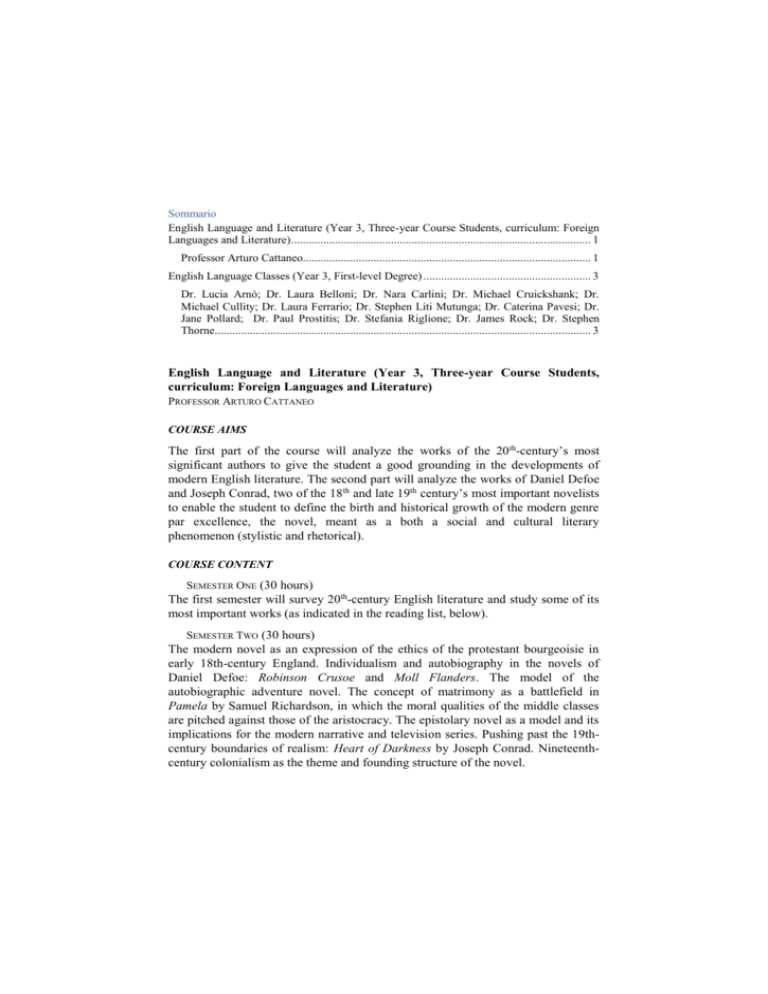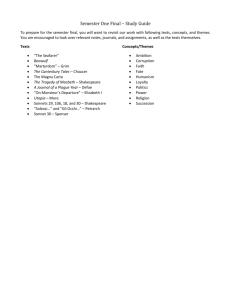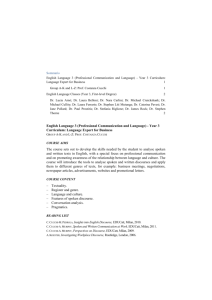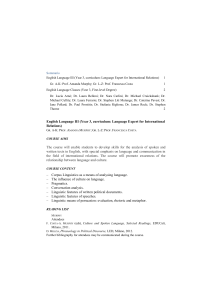English Language and Literature (Year 3, Three
advertisement

Sommario English Language and Literature (Year 3, Three-year Course Students, curriculum: Foreign Languages and Literature) ...................................................................................................... 1 Professor Arturo Cattaneo.................................................................................................. 1 English Language Classes (Year 3, First-level Degree) ......................................................... 3 Dr. Lucia Arnò; Dr. Laura Belloni; Dr. Nara Carlini; Dr. Michael Cruickshank; Dr. Michael Cullity; Dr. Laura Ferrario; Dr. Stephen Liti Mutunga; Dr. Caterina Pavesi; Dr. Jane Pollard; Dr. Paul Prostitis; Dr. Stefania Riglione; Dr. James Rock; Dr. Stephen Thorne................................................................................................................................ 3 English Language and Literature (Year 3, Three-year Course Students, curriculum: Foreign Languages and Literature) PROFESSOR ARTURO CATTANEO COURSE AIMS The first part of the course will analyze the works of the 20 th-century’s most significant authors to give the student a good grounding in the developments of modern English literature. The second part will analyze the works of Daniel Defoe and Joseph Conrad, two of the 18th and late 19th century’s most important novelists to enable the student to define the birth and historical growth of the modern genre par excellence, the novel, meant as a both a social and cultural literary phenomenon (stylistic and rhetorical). COURSE CONTENT SEMESTER ONE (30 hours) The first semester will survey 20th-century English literature and study some of its most important works (as indicated in the reading list, below). SEMESTER TWO (30 hours) The modern novel as an expression of the ethics of the protestant bourgeoisie in early 18th-century England. Individualism and autobiography in the novels of Daniel Defoe: Robinson Crusoe and Moll Flanders. The model of the autobiographic adventure novel. The concept of matrimony as a battlefield in Pamela by Samuel Richardson, in which the moral qualities of the middle classes are pitched against those of the aristocracy. The epistolary novel as a model and its implications for the modern narrative and television series. Pushing past the 19thcentury boundaries of realism: Heart of Darkness by Joseph Conrad. Nineteenthcentury colonialism as the theme and founding structure of the novel. READING LIST Reference manual: A. CATTANEO, A Short History of English Literature, Mondadori Università, 2011. Semester One: M. H. ABRAMS-S. GREENBLATT, The Norton Anthology of English Literature, W.W. Norton & Company, New York-London, vol. 2 (or the volume on the 20th century, depending on the edition; the anthology contains the compulsory reading list texts for the syllabus of Semester 1, as listed here below and on the lecturer’s Blackboard course page and webpage). Poetry THOMAS HARDY, Hap; The Convergence of the Twain; In Time of “The Breaking of Nations”. RUPERT BROOKE, The Soldier. SIEGFRIED SASSOON, Glory of Women. WILLIAM BUTLER YEATS, Down By the Salley Gardens; No Second Troy; Easter 1916; Sailing to Byzantium. D. H. LAWRENCE, Snake. T.S. ELIOT, The Love Song of J. Alfred Prufrock; The Hollow Men. STEVIE SMITH, Not Waving but Drowning. W.H. AUDEN, Spain; Musée des Beaux Arts. DYLAN THOMAS, Do Not Go Gentle into That Good Night. PHILIP LARKIN, Talking in Bed; Sad Steps. DEREK WALCOTT, A Far Cry from Africa. M. NOURBESE PHILIP, Discourse on the Logic of Language. SEAMUS HEANEY, Digging. Prose VIRGINIA WOOLF, Professions for Women. KATHERINE MANSFIELD, The Garden Party. JAMES JOYCE, The Dead. HANIF KUREISHI, “You Will Always Be a Paki”. Semester Two: DANIEL DEFOE, Moll Flanders, Penguin Books. JOSEPH CONRAD, Heart of Darkness, Collins Books. TEACHING METHOD The course is a one-year course (3 hours of lectures per week) and will be taught in English. The class will watch clips from the film adaptations of some of the novels read in the course. The lecturer will provide the students with photocopies of the texts and images that are hard to find and will upload them to his webpage and Blackboard course page. ASSESSMENT METHOD Final oral exams after sitting a written test on the subjects studied in Semester One in the scheduled exam sessions. The exam will be in English. Given that any serious literary and cultural knowledge is based on a knowledge of languages and that, today, this knowledge is considered an indispensable tool for the application of learning in the workplace, the exam will primarily test the student’s knowledge of the significance and the exact pronunciation of the words in the course texts, after which the student will be asked to analyse the texts in line with the basic principles of rhetorical and stylistic analysis. In addition, the students will be expected to have a good grasp of the key aspects of modern English civilisation and culture. NOTES The course is for students reading Foreign Languages and Literature. The student must bring the course texts to lectures. Further information can be found on the lecturer's webpage at http://docenti.unicatt.it/web/searchByName.do?language=ENG, or on the Faculty notice board. English Language Classes (Year 3, First-level Degree) DR. LUCIA ARNÒ; DR. LAURA BELLONI; DR. NARA CARLINI; DR. MICHAEL CRUICKSHANK; DR. MICHAEL CULLITY; DR. LAURA FERRARIO; DR. STEPHEN LITI MUTUNGA; DR. CATERINA PAVESI; DR. JANE POLLARD; DR. PAUL PROSTITIS; DR. STEFANIA RIGLIONE; DR. JAMES ROCK; DR. STEPHEN THORNE COURSE AIMS Overall, the course aims to equip the student with in-depth knowledge of the specific linguistics and terminology of their chosen field of study and develop their written and oral abilities to use English in their selected professions. Special emphasis will be placed on expanding their lexical repertoire, including the use of idiomatic phrases. At the end of the course, the student is expected to demonstrate that they have learned the implicit and explicit meanings of the texts handed out in class and the key points to emerge from the authentic audio texts that discuss difficult subjects, even when these are not specifically indicated. Translation is an integral part of the course, both from English to Italian and vice versa. COURSE CONTENT The students will be given a vast range of materials carefully selected from the internet, newspapers and magazines in line with their chosen field of study. The material will be provided in various formats, including written documents, graphic and visual information and audio texts. The course incorporates a translation module and will enable the student to translate authentic texts related to their chosen field of study. READING LIST Students are invited to obtain a monolingual and a bilingual dictionary to refer to throughout their entire study programme. Recommended dictionaries: Bilingual Il Sansoni Italiano-Inglese, Sansoni, 2010 (5th ed.) Grande Dizionario Hoepli Inglese con CD-ROM, Hoepli, 2007. Il Dizionario Inglese Italiano Ragazzini, Zanichelli, 2012. Monolingual Advanced Dictionary, Collins Cobuild, 2008 (6th ed.). Advanced Learners Dictionary, Cambridge, 2010 (3rd ed.). Advanced Learners Dictionary, Oxford, 2010 (8th ed.). English Dictionary for Advanced Learners, Macmillan, 2007 (2nd ed.). Compulsory text: Specific materials will be given for each curriculum. Additional recommended materials: C. TAYLOR, Language to Language, Cambridge University Press, Cambridge, 1998. MACMILLAN, Collocations Dictionary, Michael Rundell ed., London, 2010. or OXFORD, Oxford Collocations Dictonary, C. McIntosh ed., Oxford and New York, 2009. TEACHING METHOD Lectures. ASSESSMENT METHOD Written and oral exams. The written exam is in two parts: the first part has a duration of 1 hour 40 minutes and consists of a translation from Italian into English and a translation from English into Italian. Students are allowed to use a monolingual dictionary (Italian or English); the second part, of 1 hour 15 minutes duration, will test the student’s comprehension and drawing up of a written text, knowledge of vocabulary through a quiz and their listening comprehension ability. No dictionaries are allowed for this part of the exam. The oral exam will require the student to discuss a selection of the literature indicated during the academic year and test their oral comprehension and production and interactive skills. The student is expected to demonstrate phonetic-phonologic correctness, communicative naturalness, grammaticaql accuracy, and an appropriate use of the lexicon, as well as a good knowledge of the texts read in the course and the ability to discuss related topics. NOTES To ensure consistency in numbers and level, the students are kindly requested to attend the course they have been specifically assigned to. Third-year students who still need to pass the English Language 2 written and/or oral exam must necessarily attend the semester recovery course scheduled for Semester One and repeated in Semester Two. Further information can be found on the lecturer's webpage at http://docenti.unicatt.it/web/searchByName.do?language=ENG, or on the Faculty notice board.





